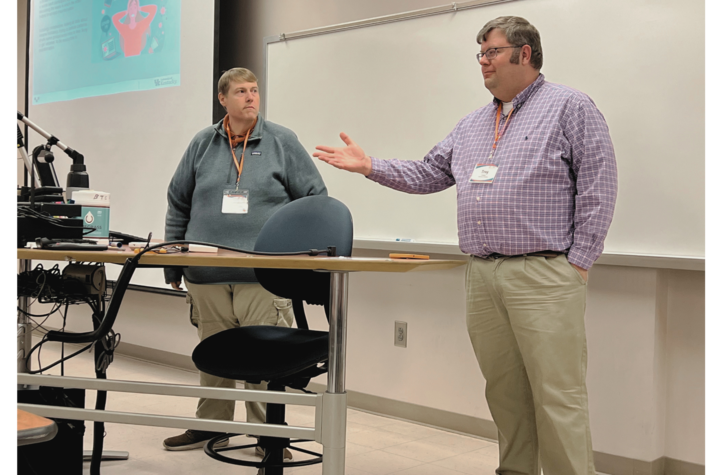By Susan Cantrell and Camille Harmon

LEXINGTON, Ky. (May 31, 2024) — Faculty fellows in the Transdisciplinary Educational approaches to advance Kentucky participated in the 11th annual Pedagogicon, hosted by Eastern Kentucky University and the Kentucky Council on Postsecondary Education Graduate Profile Academy on May 16.
This year’s theme of Student Engagement & Experiential Learning allowed educators to share information about preparing students and instructors to design and engage in meaningful, transferable educational experiences while ensuring that graduates obtain the employability skills they need for the future.
Eight TEK faculty fellows discussed their experience using transdisciplinary educational approaches to engage students in effective teamwork, communication, reflection and identification of multiple points of view for problem solving.
“It was a pleasure to share some of the academic innovations at UK by presenting my work as a TEK fellow at the Pedagogicon 2024 conference on Student Engagement & Experiential Learning," said Alice Turkington, Ph.D., associate professor in the Department of Geography. "The innovative approaches to, and scholarship on, teaching practices presented by the TEK faculty fellows to the national and international scholars in attendance will help create impactful teaching and learning in Kentucky and beyond."
The program supports faculty in developing new transdisciplinary courses and teaching existing courses with a more explicit focus on essential employability skills.
“My work, with collaborators in the Center for the Enhancement of Learning and Teaching and the College of Arts and Sciences, focused on the ways we create meaningful educational experiences that simulate the complex issues graduates might address, and prepares them for that future by teaching skills for their future employment," Turkington said. "Our TEK course used campus as a ‘living laboratory’ to understand the complexities in reducing carbon emissions to mitigate climate change impacts, and students researched and proposed an innovative way to reduce emissions by more efficiently using classroom spaces on campus."
TEK Faculty Fellows work in transdisciplinary teams to help students learn transferable skills for problem solving.
"Pedagogicon was a terrific opportunity to share our experience with team teaching. It was great talking to faculty members and administrators from institutions and spreading the word about transdisciplinary education," said Christopher Huggins, Ph.D., lecturer in the Department of Sociology. "After attending other sessions at the conference, I felt we were able to situate our own work with theirs and offer some insights about our experience."
Central to the TEK program is the development of courses focused on critical issues facing Kentucky.
"Developing and teaching a transdisciplinary course on misinformation with a colleague from a different discipline was such a good experience,” said Troy Cooper, Ph.D., associate professor in the UK College of Communication and Information's School of Information Sciences.
The list of presentations by TEK Faculty Fellows is:
- "Using Campus as a Living Laboratory in Transdisciplinary Education" — Alice Turkington, Ph.D.; Shawna Felkins; and Lauren Cagle, Ph.D.
- "Enhancing Design Thinking Through a Social Learning App: A Focus on Student Reflection" — Ryan Hargrove, Ph.D.
- "Empowering Students, Transforming Health: The Role of Design Thinking and Transdisciplinary Education in Global Health" — Ashley Cravens; Lindsey Fay; and Joel Hamm, M.D.
- "Drawing + Design Strategies for Increasing Student Engagement" — Liz Swanson
- "Transdisciplinary Team-Teaching: Strategies for Student Engagement" — Troy Cooper, Ph.D.; and Christopher Huggins, Ph.D.
As the state’s flagship, land-grant institution, the University of Kentucky exists to advance the Commonwealth. We do that by preparing the next generation of leaders — placing students at the heart of everything we do — and transforming the lives of Kentuckians through education, research and creative work, service and health care. We pride ourselves on being a catalyst for breakthroughs and a force for healing, a place where ingenuity unfolds. It's all made possible by our people — visionaries, disruptors and pioneers — who make up 200 academic programs, a $476.5 million research and development enterprise and a world-class medical center, all on one campus.
In 2022, UK was ranked by Forbes as one of the “Best Employers for New Grads” and named a “Diversity Champion” by INSIGHT into Diversity, a testament to our commitment to advance Kentucky and create a community of belonging for everyone. While our mission looks different in many ways than it did in 1865, the vision of service to our Commonwealth and the world remains the same. We are the University for Kentucky.
